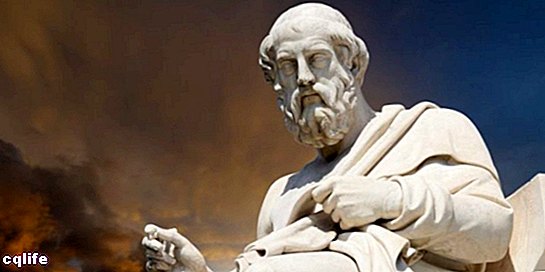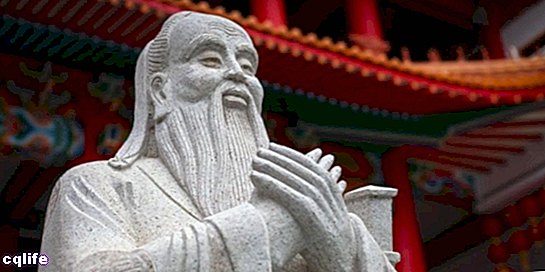- What is philosophical knowledge?
- Characteristics of philosophical knowledge
- Examples of philosophical knowledge
- Types of philosophical knowledge
- Differences with scientific knowledge
- Other types of knowledge
We explain what philosophical knowledge is, its characteristics, types, examples and how it is related to scientific knowledge.

What is philosophical knowledge?
Philosophical knowledge is the accumulated set of existential, reflective and contemplative knowledge that the humanity has been formulating throughout his history, from ancient civilizations to contemporary ones.
This model of knowledge differs from the religious one in that it does not necessarily imply the understanding of the sacred and the divine. Rather, try to understand the existence of human being just as it is. However, in many cases it shares borders or origins with the religious knowledge.
Philosophical knowledge is the fruit of long traditions of thought, organized into schools and groups, or of geniuses who revolutionized in their respective times the way in which human existence was understood.
During the golden ages of the different human civilizations, it has guided common interests and has represented the peak of the capacities of human thought, in its ability to understand the world that surrounds it.
This type of knowledge arises from the human being questions about himself, many of which do not have a simple solution, such as: "who are we?", "Where do we come from?", "Where are we going?" or “why does what exists exist?”, among many others.
Characteristics of philosophical knowledge
Philosophical knowledge aspires to be thought pure or pure reflection, and therefore does not require a praxis or a methodology check, much less than experiments. On the contrary, it obeys only the laws of logic and rational thought.
In that sense, it approaches certain forms of literature, since it depends on the language. The difference is that philosophical knowledge does not pay attention to how and forms, that is, to beauty, but to what and to the bottom, that is, it aims to find the truth.
Examples of philosophical knowledge

We can find examples of philosophical knowledge in the numerous treatises of philosophy coming from the history of humanity, especially from the great moments of thought, such as Ancient Greece, the cradle of thinkers such as Socrates, Plato and Aristotle, fundamental in the history of Western thought.
There are also non-Western philosophical traditions, such as those from the Asia Buddhist (Gautama Buddha), ancient China (Confucius, Tsun Zu, etc.), etc.
Types of philosophical knowledge
Philosophical knowledge is organized around the different branches of philosophy, which are:
- Metaphysics. The study of the nature, structure, components, and guiding principles of reality, which includes the attempt to define what is real and other concepts associated with it, such as: identity, to be, existence, object, subject, etc.
- Gnoseology. Also called Theory of knowledge, it is the philosophical branch dedicated to the study of knowledge and knowledge: its nature, its limits and its origin.
- Epistemology. Similar to the previous one, it studies knowledge from the perspective of historical circumstances, psychological Y sociological that allow to justify, validate or invalidate the knowledge of humanity.
- Logic. This branch also constitutes a formal science, akin to math, which studies the principles of demonstration, validation and invalidation of thought, as well as the notion of truth, fallacy, paradox, etc.
- Ethics. Also known as philosophy moral, focuses your interest on conduct human, and tries to define or understand concepts such as good, bad, moral, immoral, and even some more difficult such as happiness, the virtue and duty.
- Esthetic. The branch of philosophy concerned with understanding beauty and beauty, its essence and its way of perceiving itself.
- Political philosophy. This branch focuses on the study of the relationships between the human being and the community, encompassing ideas such as those of government, Condition, society, law, Liberty, equality, Justice, etc. It is essential for political science, for example.
- Philosophy of language.This branch is dedicated to the study of language, both in its fundamental and basic concepts (meaning, signifier, reference, etc.), as in its uses (pragmatics, translation, etc.), as well as its relationships with thought.
- Philosophy of the mind. Also called philosophy of the spirit, it tries to understand the human mind itself through itself, dwelling on complex issues such as emotions, feelings, dreams, thoughts and emotions. beliefs.
Differences with scientific knowledge

Some great scientists like Galileo Galilei were also philosophers.
Scientific knowledge is the object of study, organization and debate of philosophy, understood as the mother of all Sciences, since it was once the only tool available to humanity to understand the laws that govern the world, many of which today are day they are the object of the different branches of the science (chemistry, physical, etc.).
However, there is a fundamental difference: scientific knowledge requires its verification and demonstration. In other words, to understand how a natural phenomenon occurs and find its fundamental laws, it is necessary to replicate it under controlled conditions.
On the other hand, philosophical knowledge does not require verifications, beyond the formal ones: that it obeys the logic and that the thread of deductions or inductions can be followed, understandable, and has no procedural errors or fallacies.
Other types of knowledge
Other forms of knowledge are the following:
- Scientific knowledge. That which is derived from the application of scientific method to the different hypothesis that arise from the observation reality, in order to demonstrate through experiments what are the laws that govern the universe.
- Empirical knowledge. One that is acquired through direct experience, repetition or participation, without requiring an approach to the abstract, but from the things themselves.
- Intuitive insight. The one that is acquired without a reasoning formally, quickly and unconsciously, the result of often inexplicable processes.
- Religious knowledge. One who is linked to the mystical and religious experience, that is, to the knowledge that studies the link between the human being and the divine.
